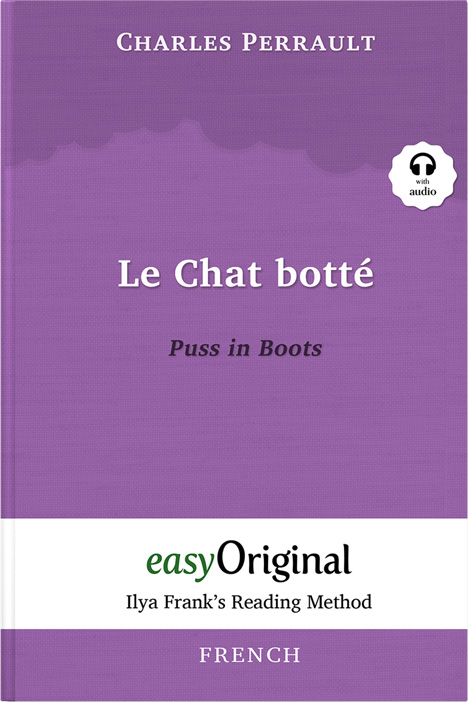Le Chat botté / Puss in Boots
„Le Chat botté“ („Puss in Boots“) is a fairy tale by French writer Charles Perrault.
Charles Perrault was a French author and laid the foundations for a new literary genre, the fairy tale, with his works derived from earlier folk tales.
Unabridged original text. Bilingual book French-English.
Le maître Chat ou le Chat botté
(Sir Cat, or Puss in Boots: "the booted cat"; maîtrem — master; sir; lord; botter — to wear boots; bottef — boot)
Un meunier ne laissa pour tous biens (a miller had left as sole possessions: "left for all goods"; laisser — to let; leave; biensm pl — belongings; possessions; goods), à trois enfants qu’il avait (to three children he had; enfantm), que son moulin, son âne et son chat (only his windmill, his donkey and his cat; ânem). Les partages furent bientôt faits (the dividing up was soon done; partager — to share; split; divide up): ni le notaire, ni le procureur n’y furent point appelés (neither the notary, nor the prosecutor were called /to help/; y — there; to there; to it). Ils auraient eu bientôt mangé tout le pauvre patrimoine (they would soon have eaten all the meagre inheritance; pauvre — poor; paltry; meagre; patrimoinem — history; heritage; inheritance). L’aîné eut le moulin (the eldest had the windmill), le second eut l’âne (the second had the donkey), et le plus jeune n’eut que le chat (and the youngest had only the cat). Ce dernier ne pouvait se consoler d’avoir un si pauvre lot (the latter could not console himself over having such a meagre share; dernier — last; latter; lotm — lot; batch; share):
Un meunier ne laissa pour tous biens, à trois enfants qu’il avait, que son moulin, son âne et son chat. Les partages furent bientôt faits: ni le notaire, ni le procureur n’y furent point appelés. Ils auraient eu bientôt mangé tout le pauvre patrimoine. L’aîné eut le moulin, le second eut l’âne, et le plus jeune n’eut que le chat. Ce dernier ne pouvait se consoler d’avoir un si pauvre lot:


Reviews
There are no reviews yet.